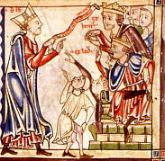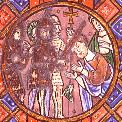![]() The
Murder of Thomas Becket
The
Murder of Thomas Becket
 Thomas
Becket was appointed Archbishop of Canterbury in 1162 and immediately became a
champion of the church. In 1164 at a Council at Clarendon Henry II tried to
pressure the bishops into a written agreement on the respective rights of the
church and crown, but Becket led their refusal. In October Becket was charged
with contempt for not answering a summons to the royal court and then accused
of financial irregularity. Faced with this second charge Becket hastily left
England for Flanders.
Thomas
Becket was appointed Archbishop of Canterbury in 1162 and immediately became a
champion of the church. In 1164 at a Council at Clarendon Henry II tried to
pressure the bishops into a written agreement on the respective rights of the
church and crown, but Becket led their refusal. In October Becket was charged
with contempt for not answering a summons to the royal court and then accused
of financial irregularity. Faced with this second charge Becket hastily left
England for Flanders. ![Early 13th century ampulla showing St Thomas Becket [Museum of London]](images/becket.gif) His dispute with Henry dragged on until 1169 when the
king became anxious to have his son, Young Henry, crowned as joint king. If
the coronation was not performed by the Archbishop of Canterbury its validity
could be challenged. A brief truce between the king and archbishop came to
nothing and in June 1170 Young Henry was crowned by the Archbishop of York
supported by several other bishops.
His dispute with Henry dragged on until 1169 when the
king became anxious to have his son, Young Henry, crowned as joint king. If
the coronation was not performed by the Archbishop of Canterbury its validity
could be challenged. A brief truce between the king and archbishop came to
nothing and in June 1170 Young Henry was crowned by the Archbishop of York
supported by several other bishops.
 Becket returned to England in
November 1170 authorised by the pope to punish by excommunication those
bishops who had usurped his rights over the coronation. Henry, who was
spending Christmas in Normandy, now became extremely angry. Seeing this, four
of his knights returned to England and attempted to arrest Becket in
Canterbury cathedral. When Becket resisted he was savagely murdered.
Becket returned to England in
November 1170 authorised by the pope to punish by excommunication those
bishops who had usurped his rights over the coronation. Henry, who was
spending Christmas in Normandy, now became extremely angry. Seeing this, four
of his knights returned to England and attempted to arrest Becket in
Canterbury cathedral. When Becket resisted he was savagely murdered.
It was not until May 1172 that Henry’s penance for the murder was accepted by the pope. Meanwhile miracles had started to occur at Becket’s tomb in Canterbury cathedral crypt and in February 1173 he was made a saint.